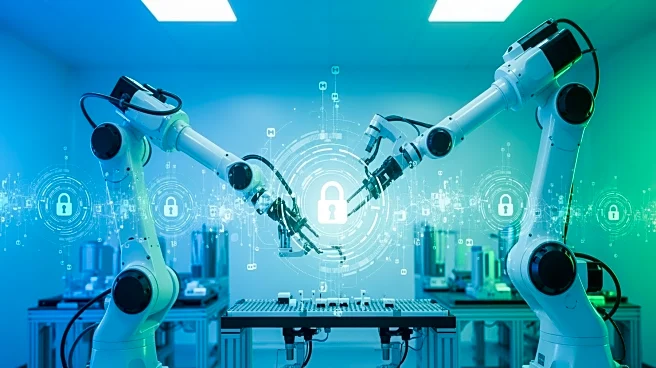What's Happening?
The pharmaceutical industry is undergoing a significant digital transformation, integrating technologies such as artificial intelligence, the internet of things, and real-time analytics into manufacturing
processes. This shift has led to smarter, faster, and more connected production floors, enhancing predictive maintenance, intelligent batch scheduling, and machine learning inspections. However, this transformation has also expanded the cybersecurity risk landscape. Manufacturing operations are now deeply interconnected with enterprise resource planning systems, clinical data lakes, and cloud-native platforms, making them vulnerable to cyberattacks. These attacks can disrupt supply chains, delay batch releases, compromise drug quality, and threaten patient safety. The integration of AI and connected devices has broadened the attack surface, raising concerns about potential manipulations of models, sensor data, and firmware. Real-world incidents have demonstrated the severe consequences of cyber breaches, including ransomware attacks and data exfiltration, which impact patient safety and global medicine access.
Why It's Important?
The cybersecurity challenges in AI-driven pharmaceutical manufacturing have significant implications for public health and the industry’s operational integrity. As life-saving products and stringent regulatory frameworks are at stake, cyber incidents can lead to financial losses and public health risks. The interconnected nature of modern manufacturing means that breaches can have far-reaching effects, including regulatory violations, product recalls, and compromised drug integrity. The industry must prioritize cybersecurity as a design principle, embedding zero trust access controls, transparent pipelines, and anomaly detection to safeguard operations. Organizations that fail to address these risks may face severe consequences, including loss of regulatory trust and patient safety. The need for robust cybersecurity measures is critical to protect intellectual property and ensure the safe distribution of medicines worldwide.
What's Next?
Pharmaceutical manufacturing is advancing towards digital twins, edge AI, and predictive analytics, which will further expand the attack surface. To prepare for this future, the industry must embrace resilience as a core principle. This includes using AI to defend AI systems, focusing on data-centric security, and evolving cryptographic approaches to withstand quantum threats. Governance will require cross-domain collaboration, integrating security, operations, compliance, and data teams to co-design secure systems. Continuous threat simulation will become standard, replacing periodic audits with ongoing resilience testing. The industry must act proactively to build secure-by-default systems that protect patient safety and regulatory trust.
Beyond the Headlines
The ethical and legal dimensions of cybersecurity in pharmaceutical manufacturing are profound. Ensuring patient safety and maintaining regulatory compliance are paramount, but the industry must also navigate the complexities of data privacy and intellectual property protection. As AI-driven systems become more prevalent, the potential for adversarial attacks increases, necessitating a shift in how security is approached. Organizations must cultivate a culture of awareness, where cybersecurity is seen as an organization-wide priority rather than the sole responsibility of IT teams. This cultural shift is essential to mitigate risks and ensure the safe and effective production of medicines.











